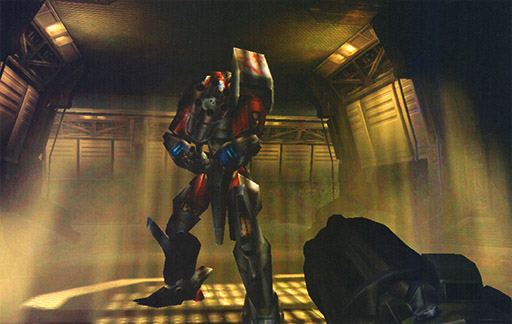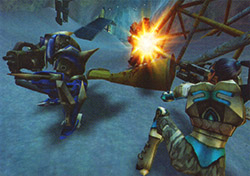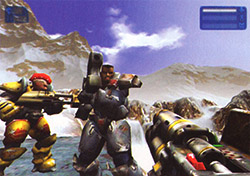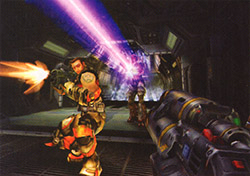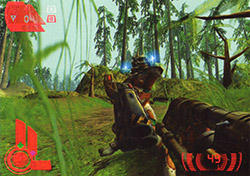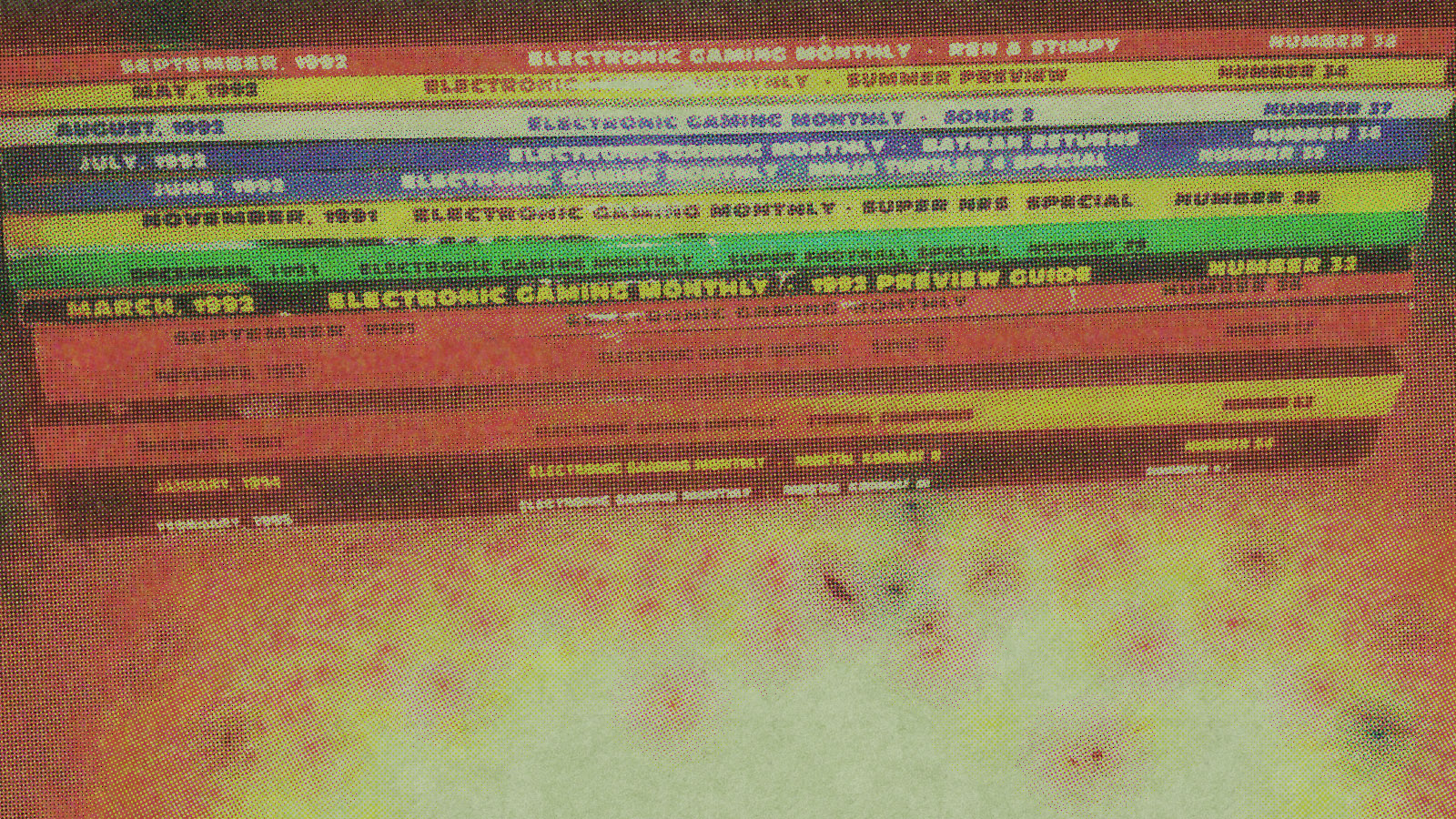
Feature
Your Broadband Future

As Microsoft prepares to announce its final plans for the Xbox Live online service, XBN presents the first in a two-part feature exploring what broadband has to offer. We ask 10 industry luminaries to discuss their vision of Your Broadband Future and reveal the five games that will launch the service this Fall. It all starts here…
By the time you read this, the E3 show will have come and gone, and Microsoft will have revealed to the world the specifics of one of its biggest gambles: Xbox Live, the broadband games service that promises to change the way you play forever.
You will know how much it will cost (we’re guessing $29.95/month with connection, or $9.95/month if you connect through your existing broadband provider) and you will know the incentives Microsoft will put behind it (A free Xbox when you sign up for a year with its provider?) and the launch dates.
If the gamble works, and it’s a gamble that Sony is also taking with its PlayStation 2 network, then we could be on the cusp of another major turning point in the history of video gaming. But unlike such white elephants as virtual reality, everyone agrees broadband gaming is the future. It’s just matter of time. The question is, are we ready for it now?
Before we obsess over the specifics (that’s Part 2), XBN has asked the industry, in the form of 10 veterans of game design—many of whom have worked on online games in the past—to give you its take on what broadband gaming will be like, not just in the near future, but years from now. Then on page 75 we exclusively reveal the online components of perhaps the most-anticipated game since Bungie’s Halo; Unreal Championship, as well as the four other games that Microsoft is counting on to take the Xbox live.
President and CEO ┐ Sonic Team (Sega)_

Then: Sega’s Yuji Naka is recognized the world over as a star video game producer and designer, often mentioned in the same breath as Nintendo’s Shigeru Miyamoto. Creator of Sega’s mascot, Sonic The Hedgehog, Naka is president of Sonic Team, the group behind the Sonic games, the classic Saturn title, Nights, as well as Phantasy Star Online, Chu-Chu Rocket and Samba de Amigo.
Now: Naka is working on a follow up to the popular Phantasy Star Online (Phantasy Star Online Ver. 2) for Xbox and Gamecube.
Project Manager ┐ Ubisoft Entertainment_

Then: Constantin is just 28 years old. He co-founded French studio Kirialys in 1995, and contracted for the now-defunct BMG Interactive, before eventually finding his way to Ubi Soft, via middleware and 3D authoring tools development and the somewhat flawed, but original, Conflict Zone for PC, Dreamcast, and PlayStation 2.
Now: Project Manager on the multiplayer Rayman Arena for Xbox and Gamecube.
President ┐ Visual Concepts Entertainment (Sega)_

Then: Founded Visual Concepts way back in 1988 and has since lead projects as diverse as the quirky Clay Fighter for Nintendo 64, the superb Madden ‘94 and, er, Tazmania. Thomas pioneered the online sports genre with highly rated NFL2K for Sega’s underrated Dreamcast in 1999, and had since gone on to produce the excellent NFL2K2 for the Xbox.
Now: Overseeing the broadband NFL2K3 and NBA2K3, and running what is fast becoming the premier US sports studio.
Creative Director ┐ Sony Online Entertainment_
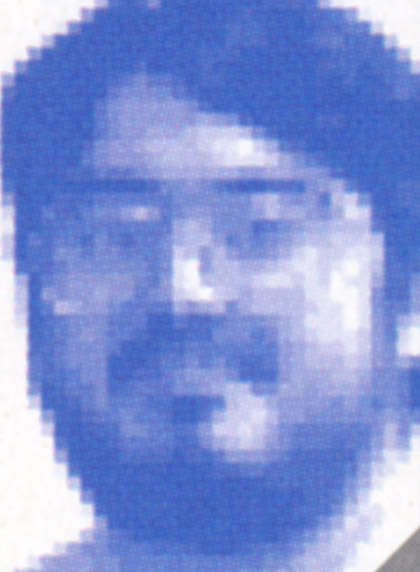
Then: A professional game designer and frequent writer on issues of virtual world design, Koster was the lead designer on the million-selling Ultima Online. His essays and writings on online world design include influential pieces such as “Declaring the Rights of Avatars,” “The Laws of Online World Design,” and, er, “A Story About a Tree.”
Now: Creative director at the Austin studio for SOE, heading up the design of the massively multiplayer Star Wars Galaxies.
Studio Director ┐ Ion Storm_

Then: Spector spent seven years at Origin Systems producing scads of addictive games including Underworld: The Stygian Abyss, Underworld 2: Labyrinth of Worlds, System Shock, Serpent Isle, Wings of Glory and many more. A brief stint with Looking Glass Technologies was followed by Ion Storm, where he directed the development of the excellent Deux Ex.
Now: As Studio Director of Ion’s Austin office, Spector is currently knee-deep in the development of Thief 3 and Deus Ex 2.
Managing Director ┐ Lionhead Studios_

Then: Molyneux invented the god-game with the release of Populous in 1988. He produced a number of innovative hits through his company, Bullfrog Productions including Theme Park, Syndicate and Dungeon Keeper. In 1997, Molyneux formed Lionhead Studios and released Black and White for PC.
Now: Heading up the Lionhead “satellites” indy development program and working on Black and White Next Generation, B.C. and Project Ego (with satellite Big Blue Box).
Joint CEO ┐ Bioware Corp._

Then: Co-founded Bioware in 1995 with Greg Zeschuk; producer on Baldur’s Gate, and Co-Executive Producer on Shattered Steel, MDK2, Tales of the Sword Coast, Baldur’s Gate II, Baldur’s Gate II: Throne of Bhaal.
Now: Co-producer on forthcoming Dungeons & Dragons massively multiplayer online RPG Neverwinter Nights; Co-producer on LucasArts’ Xbox Star Wars RPG, Knights of the Old Republic (see issue 2 of XBN).
Senior Producer ┐ Origin Systems_

Then: Hall has occupied positions as lead programmer, lead designer, producer and studio director throughout his career. Despite his current PC focus, he has also worked on console platforms, including N64 and PlayStation. Previous titles include Star Crusader, Iron and Blood, Jetfighter Full-Burn, Bass Hunter 64, Ripper and Railroad Tycoon.
Now: Senior Producer for massively multiplayer (and hugely popular) RPG, Ultima Online Live.
Founder and Creative Director ┐ Digital Extremes_
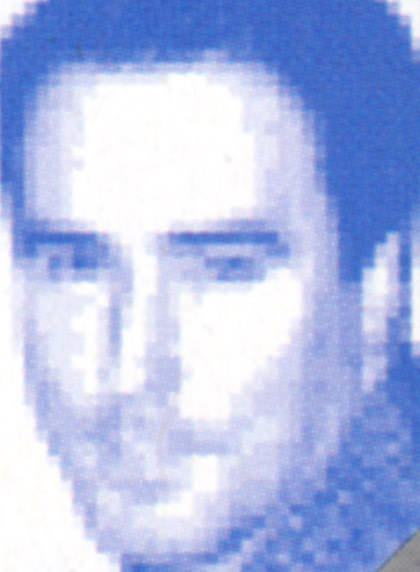
Then: Schmalz formed Digital Extremes in 1993. Since then he has supervised the generation of a number of titles, including best-selling shareware game Epic Pinball and the niche-but-highly regarded Extreme Pinball. The Quake-beating Unreal arrived in 1998 and the multiplayer-focused follow-up Unreal Tournament stormed the PC charts in 1999.
Now: Spearheading Unreal 2003 for PC, and the Xbox-only broadband killer-app, Unreal Championship (see page 76).
Joint CEO ┐ Bioware Corp._
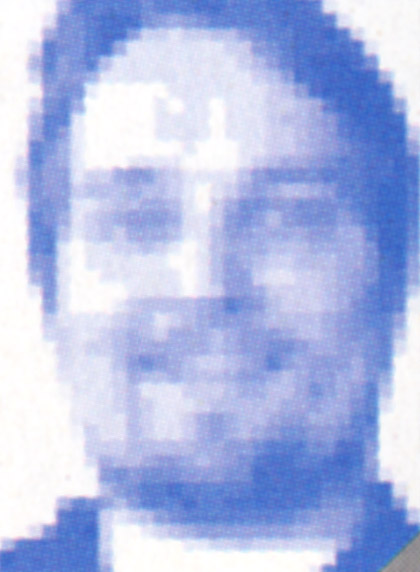
Then: Zeschuk co-produced all of Bioware past projects (mostly for now-imploding publisher, Interplay Productions) from RPGs Baldur’s Gate and Shattered Steel to the accomplished platform-shooter MDK2 and the recent hit Baldur’s Gate II.
Now: Co-Executive producer for the massively multiplayer online title Neverwinter Nights and Star Wars: Knights of the Old Republic. He also bears an uncanny resemblance to Ewan McGregor’s Obi-Wan in Episode 2. It’s the beard.

Ray Muzyka: I think the potential is definitely there for broadband to really change how people play both multiplayer and single player games. This could occur in several different ways: first, with new streaming technologies like Steam or Streamtheory becoming available, end users might be able to download new content on demand. The market could become much more “pull” oriented, rather than “push” driven.

Greg Thomas: With the introduction of broadband, we will be able to do so much more than what was accomplished on narrowband—online leagues, franchises, and tournaments are just the tip of the iceberg. In my mind, online is the next revolution for sports games.

Rick Hall: The predatory nature of the gaming industry makes every new technology into a new race…and the more significant the technology, the bigger the prize at the end. Ultimately, I believe broadband will probably prove to be the sort of quantum leap that drives online gaming to the next level, much like 3D drove graphical advancements as you mentioned.

Raph Koster: It probably won’t have quite the impact that a major shift in presentation had. After all, it affects the player’s experience, but not as much as what the player literally sees. If you look at what broadband gets you, it’s basically room to shove down more data, and lower latency.

James Schmalz: When you can count on a large majority (or all) of your customers having broadband access, as a developer, you can really start to explore some different gameplay scenarios. For the most part in the past, multiplayer has been only one part of the game, an “extra” feature. When games are focuses toward multiplayer you get a much different gameplay experience. You can see that now in the dedicated multiplayer-only games such as Everquest.

James Schmalz: Voice communication is a very exciting aspect of broadband that may very well be the gameplay leap everyone has been waiting for with the next-generation systems. And it’s unquestionable how much downloadable content will change the face of gaming and the industry. The possibilities really become endless when you think about it…new character skins, gameplay mods, entire levels of a game or possibly entire games themselves. Games will be fun, fresh, and new for much longer periods of time.

Rick Hall: Broadband allows for a vast reduction in download times, which allows game developers to create games that utilize constantly growing content. For RPGs especially, this represents a tremendous step forward. We can make games that have continuous storylines that adjust to the way the community plays. That’s an enormous difference from the old way of doing things. We can add tremendous content to the characters, opponents, even the world itself. Broadband gives us the ability to be truly interactive with our storytelling and our game designs.

Greg Thomas: One of the more exciting features in the future will be full online teams. Imagine the possibilities of composing an entire team online—my friend in Kansas will be my starting Running Back, my friend in Wisconsin will be my starting Wide Receiver and I will be in California starting as Quarterback. (Of course all of the other positions will be filled out by other friends and we will be able to play other teams of a similar nature). The possibilities are limitless.

Raph Koster: I think we need to realize, though, that the Internet can only get so good, can only get so fast, at least for most people. Broadband is not a panacea. That said, there will be experiences we can’t provide right now that we’ll be able to. We’ll be able to fit more people closer together, for example. More players in a single game. In the case of persistent online environments, we’ll have the freedom to allow much greater modifiability of the environment things like building structures, changing the landscape, and so on.

Raph Koster: What we’re going to see by the end of the year is the beginnings of what I like to call the Great License Invasion. Industry-wide, we’re seeing that online games are suddenly being made with major properties, and there’s a bit of a gold rush there to stake out key properties. This is particularly true in the persistent world subscription arena, but we’ve been seeing it with Web-based games for the last year. This has the real potential to increase the audience for online worlds significantly.

Warren Spector: If there’s anyone out there working on anything more than prettier versions of what we already have, I’ll be a little surprised. There are some folks working on interesting approaches to content delivery, all made possible by broadband, but in terms of gameplay? Don’t expect a revolution any time soon.

Rick Hall: It takes very large teams and some pretty sophisticated technology, not to mention a ridiculous amount of money. This means it’s not financially smart for most developers to dive into a new technology until they’re sure it’s got a deep enough market penetration to justify the expense and effort involved in the attempt to forge ahead into uncharted waters. I think what you’ll see between now and the end of 2002 will be iterations on themes you’ve already seen.

Greg Thomas: By the end of this year, I believe online will still be in its infancy. I don’t believe there will be much more than what we offered on the Dreamcast this past year.

Ray Muzyka: It’s quite possible that broadband content delivery could become a significant—even the dominant—way for people to get new games at some point in the next 10 years. When exactly this will occur (if it occurs) is anyone’s guess, but I think it will be subtle at first; for example, imagine sitting at home, wondering what is on television, when you realize that you can download the latest game or expansion pack to a game on your Xbox—broadband could help make games, like television, an on-demand form of entertainment.

Yuji Naka: The broadband gaming experience will allow gamers to become more engaged to the games they play because they can be connected to the network all the time. The possibilities are endless.

Greg Thomas: One of the things I see in the future (way beyond 2003) is always being connected and the ability to always receive updates from the leagues, whether it is player trades, injuries, real-time stats, coaching changes, etc. Having these elements real time as they occur during the actual season will enhance our games to a new level. This will be complete sports immersion combining real life action with a video game experience. Sports gamers will love it.

Rick Hall: If we could guarantee a much higher bandwidth—like broadband—we might be able to have hundreds or even thousands of characters acting independently in a small area. It would be possible to be able to participate as a single soldier in the Invasion of Normandy, or Caesar’s Siege on Alesia, for instance. Instead of having a few dozen characters supported by a bunch of computer controlled NPCs, the true chaos of thousands of screaming maniacs running around in an epic battle might be achieved.

Rick Hall: Yes, but there are a couple of key differences between PC games and console games. Obviously, everyone will tell you that the console controllers impose a limitation to taking games online. This is probably true, but an advantage console have is that they’ve waited before jumping online until broadband is more “mainstream.” Thus, when developers finally do start making a large number of online games for the console, they won’t be held back by having to deal with the legacy issues of narrowband. They’ll go straight to broadband and never look back.

Greg Thomas: I believe the biggest issue is the slowness in the penetration of broadband into homes. Broadband needs to be more accessible and adopted by more people. And once we have enough connections in the home, the next issue is getting them into the living rooms—and not just the home office where the PC resides.

Warren Spector: I’m still not completely convinced the world is ready for online gaming at all. I mean, even the most successful online games attract followings smaller than the most successful single-player games. The fans are loyal and they keep paying for months—even years. That makes online gaming profitable, certainly, but in terms of sheer numbers, I’m not sure online gaming is The Future, as a lot of folks seem to think it is. Having said that, broadband + console could be the thing that puts multiplayer online gaming over the top. Right now, though, I still think of online gaming as a very profitable niche, not a mass medium.

Warren Spector: Entertainment tends to be a solitary thing for most people—if they want to engage in any multiperson diversions after a hard day at work or at school, it’s probably a small group sporting event or a phone call with a friend. Most people don’t rush home every night to get out the ol’ Monopoly set and gather half a dozen friends. So why do we expect millions of people to rush home and participate in a game with 10,000 strangers, many of whom seem most interested in cursing and behaving badly? It’s all vaguely mysterious to me.

Rick Hall: I’d say the number one issue is the cost to us, the service provider. When we make an online game, we have to put together a pipeline that’s enormous. Our largest cost now is bandwidth, and we’re still only dealing with mostly narrowband customers and games that were designed to support them. If we were to switch to a broadband-only game (which we’d only do if we had a game design that truly required it) then obviously our bandwidth costs would skyrocket. Like it or not, we have to consider the business ramifications of everything we do.

Raph Koster: The most obvious is adoption. You might get lots of folks adopting broadband, but that doesn’t mean they’ll go for broadband gaming per se. There’s got to be a compelling reason to do it. The hardcore gamers, they’re already there. The penetration rate of broadband among hardcore PC gamers is pretty large already, and growing steadily. But we know the size of that market, and it’s not that big. So the question becomes, what’s the compelling reason to do broadband gaming if you’re the type of player who enjoys online bridge of Bejeweled?

Peter Molyneux: To start off with, broadband is a very very tough design problem to crack. These are the problems you’ve got: Not only have you different aged people, different cultural peoples in different time zones, but they’ve all got different levels of ability. It’s not like playing Quake in the office against someone you know, where you can decide not to play if they’re really good. In design terms, how do you balance that out? How do those people who play occasionally get as rewarding an experience as the die-hard nuts? It’s going to need to be subtle. It’s going to need to be built into a game. It can’t be done on an arena, where I go and there’s a “beginners league”, because nobody wants to play in a f_cking beginner’s league. It needs to be behind-the-scenes. Seamless.

James Schmalz: If you have to take into consideration that you must support a 14.4k modem, then you are a hell of a lot more limited than if you can depend on ALL your users having a fast broadband connection. So, we are now a lot freer to explore options that take up more bandwidth. But we do still have to worry abut bandwidth optimizations a great deal as well as latency. Those are the two major factors you need to keep in mind.

Sylvain Constantin: The main problem is to design an online game a specific system without having a prior experience on this system, and without having any other games already running online. Technical specifications can change through development, so we have to anticipate, and be ready to quickly adapt our game to any change. And finally despite the broadband promises, it should be wise (required?) to be compatible with narrowband game systems.

Raph Koster: In 2002 I’m not designing a broadband-specific gaming experience. The large market that I’m designing for doesn’t all have broadband, and therefore I’m not designing to that platform. If you are trying to reach more than the hardcore PC action gamers, you can’t limit yourself to those with cable modems or DSL.

Rick Hall: Broadband will give us the ability to eventually allow EVERYTHING to be controlled by the players. It will allow them to communicate much more effectively through spoken word, customized avatars, and their own personalities. Broadband will bring us one step closer to that Holy Grail known as “Virtual Reality.”

James Schmalz: You can pass voice as well as more data. You can make more complex situations work whereas with narrowband you needed to keep things very simple. You could only have so many projectiles or so many people on the screen. One good example is that we can simulate vehicle physics realistically and smoothly in a network game. This is complex enough that it would be very difficult to do in narrowband.

Peter Molyneux: We’ve always thought of games as something you download and that is it. With broadband there’s this ability to change the game constantly. It’s no longer a fixed game. This world or game that we’ve created can be a lot bigger than it is to begin with. Because we do design things to fit on a DVD at the moment—and that’s very limited. When you’ve got broadband, suddenly that goes away. You’ve got an infinite amount of space and an infinite amount of content to push forward. It’s going to be a totally new genre.

Greg Zeschuk: On platforms like the Xbox people will never be exposed to the pain of narrowband they’re going to jump right to a nice, fat connection. Everyone is going to have a better experience as a result of this and the audience should grow very fast. Playing across a broadband connection when everything is working well is a totally flawless experience (provided the game is well-made)—players are going to love what they find online.

Sylvain Constantin: The possibility to compete with six billion people! Not all games are designed for global competition, but I think online gaming as a “virtual” sport will become more and more popular. It’s very exciting. My dream is that through online games, people could become professional players, solo or in teams (depending of the game) and earn their “lives” by playing. These virtual sports will become more and more popular (there are already TV shows in Korea for video games competitions), and I think that one day, Quake-like championship will become as popular as the “real world” soccer World Cup.

Raph Koster: You’re thinking in terms of releasing authorship, rather than expressing yourself. Online games are about other people, really, and the mechanics need to reflect that. This manifests itself in lots of ways, ranging from the “modding” community that has sprung up around first person shooter games, to the extremely undirected experiences that massively multiplayer games provide, where narratives are largely absent. This in particular is alien to a lot of game designers.

James Schmalz: It’s a totally different mindset. The biggest difference is that in a single player game you are the hero. You are the main character in the story. So scenarios can be predicted. In a multiplayer game everyone still wants to be the hero, or at the very least everyone wants to have the ability or chance to become the hero, making the gameplay possibilities endless and completely unpredictable.

Greg Zeschuk: With online games your goal is to attract and then retain an audience—you need to make games with longevity that give players a reason to keep coming back. Online games require more content ii they involve any aspect of exploration. If they involve a competitive mode it has to be better not only than all the games currently available, but all the games coming down the pipe.

Rick Hall: With online games, we have to deal with the fact that some people use the anonymity provided by the Internet as justification to harass their fellow gamers. They go out of their way to destroy the experience of everyone around them. Dealing with this from within the game’s design is considerably more difficult than you might imagine, but it has to be done. A single troublesome player can drive away hundreds of subscribers.

Rick Hall: I think it would be incredibly fun to build a game where I could be a pilot on a starfighter, but part of a much larger military conflict. This kind of game is probably still a few years from being possible. Of course, broadband would help in being able to have hundreds of other fighters blasting away at each other, not to mention being able to talk during the battle to my other squadron members, and hear orders from a base commander somewhere. Imagine if there were huge capital ships flying around out there, and my job was to protect them, seek-and-destroy the enemy capital ships, and explore the universe. I guarantee you if someone makes a game like that, I’ll be the first one in line to buy a microphone/headset, joystick, foot pedals, and anything else I need in order to play.

Warren Spector: I’d like to be able to play with friends scattered all around the country and all around the world. I’d like sufficient tools to interact with them in ways that didn’t feel forced or—a chat line with pretty pictures just doesn’t cut it. I’d like all of this in the context of a narrative that’s richer and more varied than the typical fantasy or sci-fi scenario. I mean, killing monsters and going on random quests if all well and good but how about something more? Not too much to ask, is it? We’re pretty close to providing that experience already.

Yuji Naka: My ultimate online gaming experience would be a game that allows you to experience virtual senses through the network, not with television as a medium. You would not only, be able, to hear, see and feel, but also even taste and smell.

Sylvain Constantin: I think that some kind of global virtual world, recreating a better clone of our world, and in which anything possible in real life (and more…) would be possible, would be absolutely fantastic.

Greg Thomas: The opportunity to have a unique playing experience every single time online with multiple players would be the ultimate challenge. Even more than just playing, we are managing the entire team, making all the decisions. playing all of the games and essentially having our “own NFL”‘-so to speak. We may even decide to change rules or other elements in the game to make it more fun. This would be an incredible gaming experience that would be so addicting to me. I don’t think I would get any work done…l would play all day long.

Rick Hall: Aside from the hope that someone will make my starfighter game, I’d also like to see someone make a persistent RTS. RTS games are lots of fun, but if someone were to create a system that allowed me to accumulate gains over time, that would add an extra dimension.

Warren Spector: Star Wars Galaxies. I know the guys making it, know their ambitions and I’ve seen some of their stuff. And it’s Star Wars, for crying out loud. I don’t know if anyone’s working on such a thing but an online basketball game where each onscreen player was played by an offscreen one, with league play and all… that would totally rock. I might lose myself in a game like that.

Ray Muzyka: PC MMORPG’s – Star Wars Galaxies, Worlds of Warcraft, and Earth and Beyond, for example. There are many, many more MMORPG’s in development now and we want all of them to succeed but unfortunately the market is probably only large enough for a few of these to thrive at any one time. As well, it will be interesting to see games like Final Fantasy XI to see what console fans think of the MMORPG on the video game console.

Greg Thomas: Halo 2 because Halo was so awesome and yet being online will make it that much better. Fever 2003 just to see if they are able to innovate much with online gameplay.

Raph Koster: The Sims Online, certainly, in order to see what acceptance a more social model of the online world gets from the gaming market. It’s going to be interesting to see what proportion of the extremely casual Sims audience chooses to pay a subscription fee, for example. And beyond that, the game is such an empowering platform that I am very curious to see what users make of it. I am likewise very curious about the work being done over at Linden Labs [lindenworld.com], for similar reasons.

Greg Thomas: Definitely sports games because they are so much better online. Being able to play against millions of different people is such a better experience than having to play against the computer. People do crazy, smart, stupid, exciting things that we just can not program into our Al. This is why sports games online will be revolutionary.

Warren Spector: If you buy my contention that online gaming is a (big) niche rather than a mass-market proposition, you have to look to the roleplaying games for the core audience. But, really, it seems like sports games offer immense possibilities that. as far as I know. have been dramatically underexploited, both creatively and from a business standpoint. (Again, if anyone out there is actively working on a league-based, individual-player-level. basketball game, and you’re looking for testers. give me a holler.)

Rick Hall: Atmosphere and immersiveness being the biggest benefactors to broadband, I think it makes sense that RPGs will be the big winners. They are highly dependent on realistic atmospheres, and would be the types of games that would benefit most from having large crowds in small places.

Peter Molyneux: I don’t think the next great game is going to be based in a fantasy world. I don’t think it’s going to be elves versus goblins in some space-future-freaky weird place. I think it will almost certainly be something to do with violence, in the first-person.
Digital Extremes reveals the online details of the game that could get us all connected
If there’s one thing that’s been conspicuously lacking from the Xbox broadband story it’s buzz; an unfortunate consequence of a tight-lipped, round-the-houses approach to public relations from Microsoft and a necessarily long gestation period for the network.
By the time you read this, the E3 show would have been and probably gone, and the Xbox broadband plans common knowledge, scattered to the four winds of the Internet. What’s likely to headline the whole shooting match is- well, the whole shooting match that is Unreal Championship. Until now, details of the game have been in short supply. Now Digital Extremes founder and director James Schmalz speaks exclusively to XBN about the game charged with making Xbox Live a global success.
Xbox Nation: Please describe the online components of UC and how they work.
James Schmalz: You will be able to quickly get into a multiplayer match with just a few button clicks. You will be able to communicate through your Communicator headset and talk to other players. You will also be able to download new content for the game such as new maps, new game types and new characters. These are probably the biggest online components of UC.
XBN: How will we connect to the service? Will you have an “Xbox Live” button on the main menu of the game?
Schmalz: It will be seamless for the user, other than simply selecting the multiplayer menu option. Once you go in there, you will be able to setup and configure your online character and then select the kinds of games you want to play. It will be incredibly easy to use.
XBN: What is your opinion of the Microsoft broadband strategy? What aspects of it make broadband gaming easy, and what aspects are challenging for you as developers?
Schmalz: Their strategy is excellent and will deliver a fantastic online experience. The great thing for gamers is that, other than doing a quick and easy configuration of your Xbox for getting it hooked up online, playing a game like UC will be incredibly simple for you. Just as easy as starting a single player game. We don’t want people to abandon the online portion because it’s too difficult to understand or takes too long to get online. Our goal and Microsoft’s goal is to make it as easy and fun as possible.
XBN: It was leaked in the United Kingdom that UC would have a fee for online play. Will you be charging for UC online?
Schmalz: As far as we’re concerned there isn’t a subscription fee for Unreal Championship specifically. No one involved on the publishing or development side (that is lnfogrames, Digital Extremes or Epic Games) will be charging to play this game online. Microsoft has indicated there may be a service fee to subscribe to the Xbox Online service, but no fees specific to UC. But that said, there is a very strong single-player element to UC, so you can play the entire game without subscribing to the Xbox online service at all if you wish.
XBN: Not that it really matters much, but is there a plot?
Schmalz: In the future an alien race has enslaved humanity and several other alien races. Much like the ancient Roman gladiator battles, this overlord race forces the best humans and other enslaved races to compete in similar gladiator battles. Your goal is simple—to win and be the best. We have over 50 characters composed of six different species on six different worlds. We have a huge range of locations from a frozen tundra level to a molten lava level.
XBN: How will the online game differ from the single-player experience?
Schmalz: You will be able to select from a large variety of different game configurations. You can host your own game or join into any of the multitude of other games. We will have a ranking system so you can see how you rate against every other player. We have tons of different game types, and game mutators and game configurations. There is plenty of variety to play however you enjoy playing the most.
XBN: Will you be able to play the single-player “story” over the network with 16 player co-operative play?
Schmalz: The story is very secondary to the gameplay. The focus of our single-player game is to make it as enjoyable as the multiplayer and as similar as possible to the multiplayer element of the game. Our enemy Al or ‘bots’ have evolved over the last six years to be what we think are the most human-like bots in any game. So, the main separation between single player and multiplayer is the fact you are playing against bots, but it is just as enjoyable at fighting real people. In fact, many people have commented on how difficult it is to tell the difference between the bots and a real human player.
XBN: What kind of environments can we expect to see?
Schmalz: We are trying hard to make each arena unique, interesting and as varied as possible. We have sprawling outdoor terrain levels and tight, confined one-on-one dungeon-style deathmatch levels. The key for us is variety. Several of the worlds we have created include a desert planet, ice planet, volcanic lava planet, and an alien-built artificial planet.
XBN: Is there one that’s your particular favorite?
Schmalz: Not really. I have no one specific favorite at the moment. All the levels are evolving over the weeks as they get refined and adjusted. I do love the ones that are so visually spectacular that they look like movie sets, such as a level called DM-Core. It looks as if you’re running through the corridors of a set in one of the Alien movies.
XBN: The graphics are particularly impressive. What in particular are you most proud of in this respect?
Schmalz: I think probably the variety of locales. It would be easy enough for us to just make one style and duplicate it 30 times, but we put a huge amount of effort into making each arena as unique and different as possible. Certainly we have some with similar themes, but within each of those we strive for a unique look. And the graphical power of the Xbox allows us to make scenes that are literally 100 times more complex than anything we’ve done before.
XBN: What kind of support will you be providing to players online? Leagues? New missions? Easter-eggs?
Schmalz: We will have ranking and stats. Certainly downloadable levels and other content. We would love to support Leagues and Tournaments!

Free when you subscribe to Xbox Live, Microsoft’s headset may leave you looking like a cross between Lance Bass and a Navy Seal (N’ Sunk?) but the payoff will be worth it. You’ll be able to speak to your teammates in Unreal and Ghost Recon, and shout abuse at your opponents in Whacked! Games will eventually support for voice recognition, allowing you to issue game commands to change weapons, check inventory, or use items. As an added incentive to sound silly as well as look it, the Communicator can also alter your voice in a variety of ways. Xbox Nation has heard the future, and it sounds like Greg Orlando doing Darth Vader… (Oh, wait, that didn’t come out right at all).
There are four other games that will launch with Xbox Live.
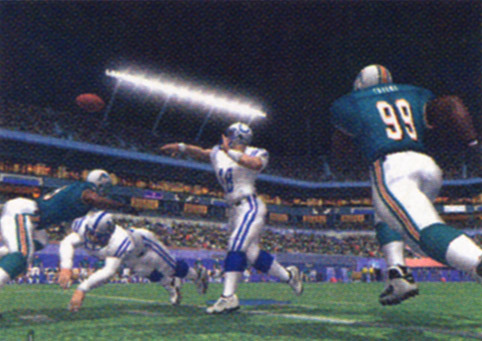
Features are still under wraps, nut the Holy Grail of football games, according to Sega’s Greg Thomas, is to make each position human-controlled.
Microsoft’s own bid to steal the coveted Madden football crown goes online this fall in the shape of a new NFL Fever. There are no details yet, but you can count on Sega’s NFL 2K series on Dreamcast being a big influence. Rumors persist, however, that fans of NFL 2K will have to wait, as Microsoft is keen to give its own game the home advantage by being the only football title offered on the Live network.

Squad-based combat, in the for of Ghost Recon, should suffice until Halo 2 arrives some time next year.
Red Storm’s Tom Clancy tactical FPS is another surefire hit for the Xbox Live service. Widely regarded as one of the best games ever on PC, the Xbox version sports 10 multiplayer maps in addition to its 15 single-player missions, and supports up to 16 players. The game is also armed with enemy Al that had even the Halo team marvelling at the recent Game Developers Conference.
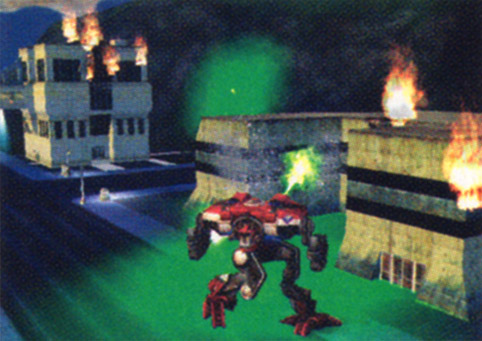
Microsoft is taking the usually staid mech genre into the realm of the arcade shooter with its amped-up Mech Assault.
Created by the minds behind another successful PC franchise, Mech Warrior, Assault replaces the sim elements with arcade shooter DNA. Players take control of fast, maneuverable “Mechs” from a third-person perspective and blast the nuts and bolts out of each other over destructible cityscapes. Mech Assault supports matchmaking, buddy lists, live chat, creepy voice augmentation and game swapping.
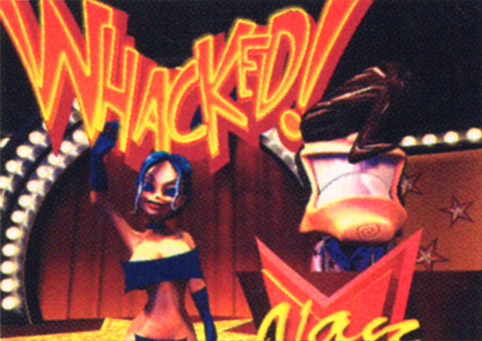
There’s a limit to how many ‘whacky’ games one console can sustain. Microsoft may have reached, and breached that limit with Whacked!
Some games were meant to be online, and none perhaps more so than the wacky Whacked! Microsoft’s four-player frag-fest though something of a lame duck in single-player, will provide comic relief for the Xbox Live crowd over the network. No word yet on any special features, but this is fertile ground for expansion packs, new comedy-levels and downloadable characters and weapons.
